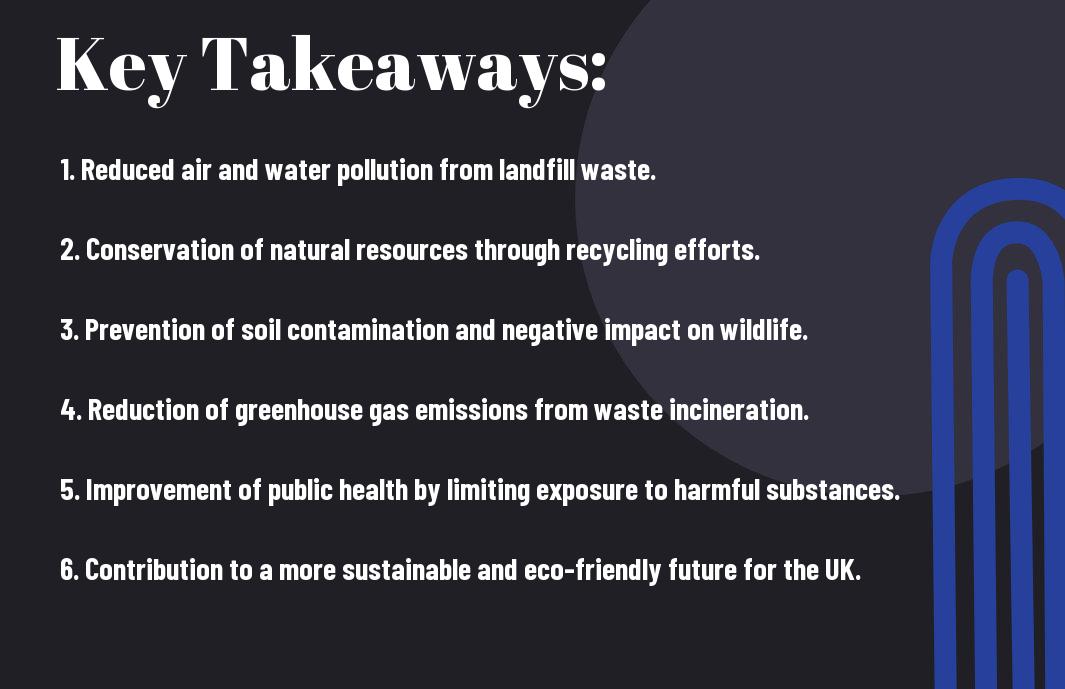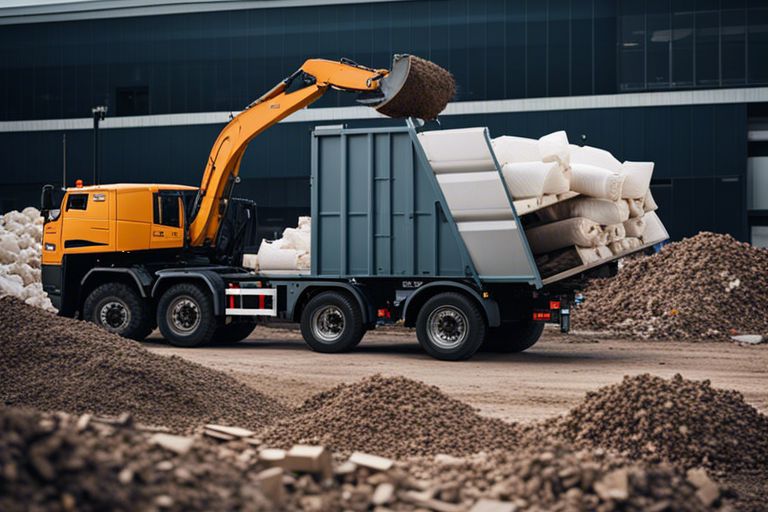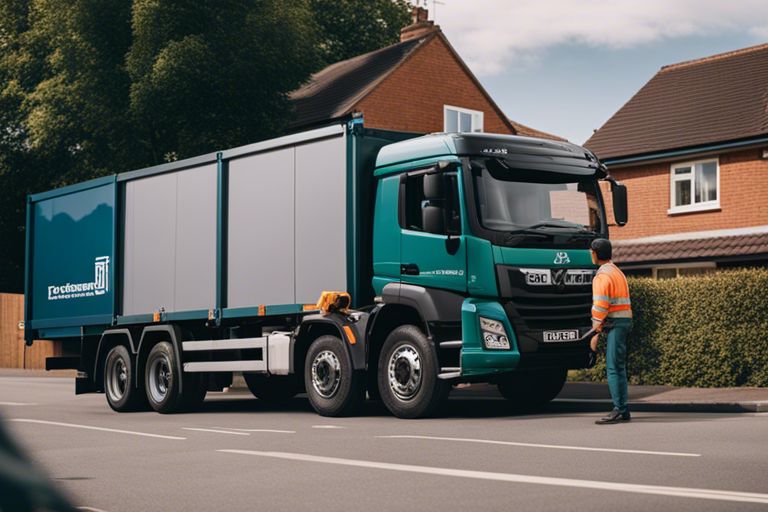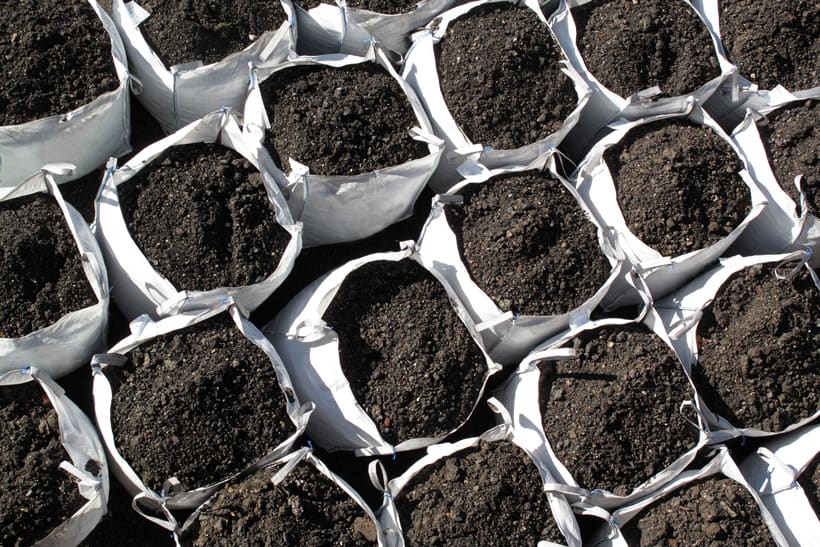Infinitesimal changes in our daily habits can have a monumental impact on the environment, and proper waste disposal is no exception. In the UK, the way we dispose of our waste not only affects our immediate surroundings, but also has far-reaching consequences for the health of our planet. From reducing pollution to conserving natural resources, proper waste disposal plays a crucial role in safeguarding the environment for future generations. By understanding the environmental benefits of responsible waste management, we can empower ourselves to make informed decisions that contribute to a cleaner, healthier world.
Key Takeaways:
- Reduction of pollution and greenhouse gas emissions through proper waste disposal.
- Conservation of natural resources by recycling and reusing materials.
- Protection of biodiversity and ecosystems from the harmful effects of improper waste disposal.

Environmental Impacts of Waste
Proper waste disposal is crucial for minimising the environmental impacts of waste in the UK. Improper disposal can lead to pollution, greenhouse gas emissions, soil and water contamination, and harm to wildlife and natural habitats. Understanding these environmental impacts is essential for promoting responsible waste management practices.
Pollution and Greenhouse Gas Emissions
Pollution from improper waste disposal can contaminate air, water, and soil. Landfills and incineration facilities release harmful chemicals and greenhouse gases such as methane and carbon dioxide into the atmosphere, contributing to climate change and air pollution. These pollutants can have serious implications for public health and the environment, leading to respiratory diseases, water contamination, and damage to ecosystems.
Effects on Soil and Water Quality
Improper waste disposal can result in leachate, a harmful liquid formed as water percolates through waste materials, contaminating soil and groundwater. This can lead to irreversible damage to soil quality, affecting agricultural productivity and natural ecosystems. Contaminated water sources can also endanger human and animal health, causing waterborne diseases and disrupting aquatic ecosystems.
Furthermore, the release of toxins from waste materials can disrupt the natural balance of soil and water systems, negatively impacting biodiversity and ecosystem stability.

Strategies for Proper Waste Disposal
Proper waste disposal is crucial for the environmental sustainability of the UK. It is essential to implement effective strategies for managing waste to minimise its impact on the environment. One significant strategy is to promote the Environmental Sustainability Impacts of Solid Waste Disposal.
Recycling and Composting Practices
Implementing efficient recycling and composting practices is essential for diverting waste from landfills. By recycling materials such as paper, glass, and plastics, the amount of waste sent to landfills can be significantly reduced. Additionally, composting organic waste can help create nutrient-rich soil for agriculture and reduce methane emissions from landfills.
Innovative Waste-to-Energy Solutions
Embracing innovative waste-to-energy solutions, such as incineration and anaerobic digestion, can help convert waste into energy. This not only reduces the volume of waste sent to landfills but also produces renewable energy. However, it is essential to carefully manage these processes to ensure proper emissions control and minimise environmental impact.
It is important to note that waste-to-energy solutions should complement recycling and composting practices, rather than substitute them. Utilising a combination of these strategies can contribute to a more sustainable approach to waste management, maximising resource recovery and minimising environmental harm.
Policy and Regulation
UK Waste Management Laws and Directives
The United Kingdom has a comprehensive legal framework for waste management. The Environmental Protection Act 1990, the Waste and Emissions Trading Act 2003, and the more recent Waste (England and Wales) Regulations 2011, are just a few examples of the legislation in place to regulate waste disposal and management. These laws set out the responsibilities of individuals, businesses, and local authorities in managing waste, and aim to promote the reduction, reuse, and recycling of waste materials.
Non-compliance with these laws can result in hefty fines and even imprisonment for serious offences. The UK is also required to adhere to European Union Directives on waste management, which set specific targets for recycling and landfill diversion. These laws and directives play a crucial role in shaping waste management practices in the UK, setting a high standard for environmental responsibility.
Role of Government and Private Sector
The government plays a key role in developing and implementing waste management policies, providing guidance and support to local authorities and businesses. It also allocates funding for recycling initiatives and research into more sustainable waste management practices. The private sector, on the other hand, has a significant responsibility in managing their own waste and reducing their environmental impact. Many businesses are now investing in innovative technologies and processes to improve their waste management practices, contributing to a more sustainable economy.
Collaboration between the government and the private sector is essential in driving forward more environmentally-friendly waste management solutions. The government sets the regulations and targets, while the private sector implements and innovates to achieve these goals. Together, they have the potential to make a significant impact on the country’s environmental well-being.
It is important for both the government and the private sector to work together in ensuring that waste management practices are environmentally friendly and sustainable. By aligning their efforts, they can effectively tackle issues such as single-use plastics, electronic waste, and landfill diversion, ultimately contributing to a healthier and cleaner environment for all.
Case Studies and Success Stories
Proper waste disposal in the UK has led to remarkable success stories and tangible environmental benefits. Let’s delve into some case studies to understand the impact of effective waste management.
- Case Study 1: In Hertfordshire, a community-led initiative resulted in a 30% reduction in landfill waste within a year, saving over 500 tonnes of waste from ending up in landfills.
- Case Study 2: A major supermarket chain’s corporate responsibility initiative led to a 25% reduction in single-use plastic packaging, preventing approximately 1,000 tonnes of plastic from entering the environment annually.
- Case Study 3: A local council’s partnership with waste management companies saw a 40% increase in recycling rates, diverting over 300 tonnes of recyclable materials from landfills.
Community-Led Initiatives
Community-led initiatives have played a vital role in improving waste disposal practices across the UK. By organising local clean-up drives, awareness campaigns, and recycling projects, communities have significantly reduced the amount of waste destined for landfills. These initiatives have not only empowered local residents to take ownership of their environment but have also fostered a sense of unity and responsibility towards sustainable waste management.
Corporate Responsibility in Waste Reduction
Corporate responsibility initiatives have proven to be instrumental in driving waste reduction efforts in the UK. With a focus on sustainable packaging, energy-efficient operations, and recycling programmes, companies have demonstrated a commitment to minimising their environmental impact. These initiatives not only benefit the planet but also enhance brand reputation and customer loyalty by aligning with green values and ethical practices.
In addition, many businesses have been adopting circularity principles, promoting the reuse and recycling of materials to minimise waste generation and contribute to a circular economy.

The Environmental Benefits of Proper Waste Disposal in the UK
In conclusion, the proper disposal of waste in the UK has significant environmental benefits. By reducing the amount of waste that ends up in landfills, we can minimise the release of harmful gases and pollutants into the atmosphere. Proper waste disposal also helps to conserve resources, as materials can be recycled and reused instead of being discarded. Additionally, efficient waste management can protect local ecosystems and wildlife by preventing contamination of soil and water sources. Ultimately, investing in effective waste disposal practices not only benefits the environment, but also promotes a healthier and more sustainable future for generations to come. It is important for individuals, businesses, and governments to work together to ensure that waste is disposed of responsibly, in order to achieve these positive environmental outcomes for the UK.
FAQ
Q: What are the environmental benefits of proper waste disposal in the UK?
A: Proper waste disposal in the UK helps reduce pollution, conserves resources, and minimises the impact on wildlife and ecosystems.
Q: How does proper waste disposal help reduce pollution?
A: Proper waste disposal prevents toxins and chemicals from leaching into the soil and water, reducing air, soil, and water pollution.
Q: What resources are conserved through proper waste disposal?
A: Proper waste disposal reduces the need for raw materials, energy, and water, contributing to resource conservation and sustainable use.
Q: How does proper waste disposal minimise impact on wildlife and ecosystems?
A: Proper waste disposal prevents wildlife from ingesting or becoming entangled in waste, and protects ecosystems from contamination and destruction.
Q: What are the long-term benefits of proper waste disposal for the environment?
A: Proper waste disposal contributes to a healthier and more sustainable environment, helping to address climate change, preserve biodiversity, and improve public health.







